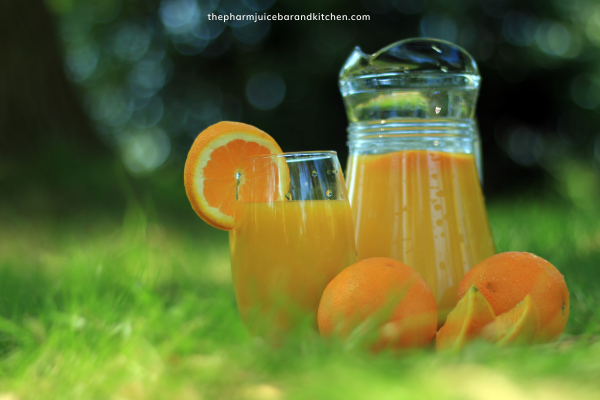How Many Oranges For 1 Cup Juice? Juicing oranges is one of the healthiest and most delicious ways to enjoy Vitamin C. Not only does freshly-squeezed orange juice have a bright, tart flavor that goes great in everything from smoothies and juices to sauces and marinades, but it’s also packed with essential nutrients like potassium, folate, calcium, magnesium and vitamin B6. If you want to make your own orange juice at home, you may be wondering how many oranges will give you one cup of juice – after all there are so many sizes available!
In this blog post we’ll explore just how much fresh squeezed orange juice you can get out of different sized oranges as well as consider some tips for choosing the best citruses for juicing. So let’s learn more about squeezing up a glassful of healthy goodness today!
What Is Orange Juice?
Orange juice is a nutritious and delicious beverage that has been enjoyed for centuries. Made by extracting the juice from oranges, its bright orange color and refreshing taste make it a popular choice among consumers. Not only does it provide a significant source of vitamin C, but it also contains other beneficial vitamins, minerals, and antioxidants that can boost overall health.
Whether freshly squeezed or store-bought, orange juice can be consumed plain or mixed with other ingredients to create a variety of tasty concoctions. So, next time you enjoy a glass of orange juice, remember that there’s more to it than just a simple fruit juice.
The Importance Of Measuring Orange Juice
In the world of food and beverage, measuring is an essential component of producing high-quality products. This is especially true for orange juice, a popular drink that is consumed worldwide. Properly measuring orange juice allows for consistency in taste, texture, and nutritional content. It also ensures that the right amount of juice is used in each recipe, which prevents over or under-utilizing ingredients.
Measuring orange juice is also crucial for those who are health-conscious or have specific dietary restrictions, as it allows them to accurately track their nutrient intake. Overall, the importance of measuring orange juice cannot be overstated, as it plays a vital role in ensuring the quality and integrity of this beloved drink.
How Much Juice Is In One Orange?

Now that we understand the importance of measuring orange juice, let’s explore how much juice you can get out of a single orange. The amount of juice in an orange will depend on several factors such as its size, variety, and ripeness. Generally speaking, however, you can expect to get one cup (roughly 250ml) of freshly squeezed orange juice from three medium-sized oranges. For larger oranges, two may be needed to yield a cup of juice – and for smaller ones, about five or six should do the trick!
However, it’s important to note that juicing techniques can also impact the amount of juice you get from an orange. Using a juicer or hand-squeezing can result in varying levels of juice extraction. Whatever your preferred method, fresh-squeezed orange juice is a delicious and nutritious addition to any breakfast or snack.
Average Size Of An Orange:
The average size of an orange can vary depending on the variety and cultivation methods. Generally, oranges range in size from roughly the size of a golf ball to as large as a baseball. Navel oranges are typically larger than other varieties and can range from 3 to 4 inches in diameter. On the other hand, Valencia oranges tend to be a bit smaller, usually measuring around 2½ inches in diameter.
While there is no set measurement for what constitutes a “medium” orange, most within this range weigh about 4-5 ounces. It’s important to note that size doesn’t necessarily reflect quality – smaller oranges may be juicier and sweeter while larger oranges may have thicker skin and be more difficult to peel. Overall, the average size of an orange is just one factor to consider when selecting the perfect piece of citrus fruit for your needs.
How Many Oranges For 1 Cup Of Juice?
When it comes to making orange juice, one question that may arise is how many oranges are needed to yield one cup of juice. The answer to this question largely depends on the size and juiciness of the oranges being used, but on average, it takes about three medium-sized oranges to produce one cup of juice. If you’re looking to make a large batch of orange juice, however, you may need more than three oranges.
For example, if you’re making a quart (1 liter) of orange juice, you’ll likely need 8-10 oranges depending on size and variety.If you’re looking to make a large batch of orange juice, however, you may need more than three oranges. For example, if you’re making a quart (1 liter) of orange juice, you’ll likely need 8-10 oranges depending on size and variety. It is important to note that certain tools, such as a juicer, can help extract more juice from the oranges than simply squeezing them by hand, so be sure to adjust accordingly when making large batches.
Additionally, it is always recommended to choose ripe, firm oranges and to wash them thoroughly before juicing. With these tips in mind, making delicious and nutritious orange juice can be a simple and rewarding task.
Factors That Affect The Amount Of Juice Per Orange:
The amount of juice extracted from an orange can be affected by several factors.
-The size: The size of the orange will determine how much juice can be extracted from it. Generally speaking, larger oranges will yield more juice than smaller ones.
-The variety: Different varieties of oranges contain different levels of natural sugar and water content, and thus will produce varying amounts of juice when squeezed.
-Ripeness: Unripe oranges are typically firmer and contain more pulp, leading to reduced juice extractions.
-Tools: Using a juicer or blender instead of hand-squeezing can result in higher amounts of juice extraction from the same amount and size of oranges.
-Technique: The technique used to extract the juice from an orange can make a difference in the amount of juice produced. For example, using a muddler or simple citrus reamer may result in more pulp and less juice than using a juicer or blender.
-Freshness: Older oranges tend to contain less juice than freshly picked ones.
No matter the size, variety, or technique used, fresh-squeezed orange juice is sure to be a delicious and nutritious addition to any breakfast or snack. With all these factors in mind, you can now choose the perfect orange for your needs and enjoy homemade orange juice with ease.
How To Make Orange Juice?
Ingredients:
-3 medium oranges
-1 tablespoon sugar or honey (optional)
Instructions:
- Wash the oranges to remove any dirt and debris.
- Cut each orange in half and juice using a citrus reamer, hand juicer, blender, or juicer.
- Add the freshly squeezed juice to a cup or pitcher and stir in the sugar or honey (optional).
- Serve cold and enjoy!
Making freshly squeezed orange juice is a great way to start your day with a glass of vitamin C-packed goodness. Enjoy this delicious, homemade beverage alone or blended with other fruits for an extra kick of flavor.
Tips For Juicing Oranges Efficiently:
Juicing oranges can be a healthy and convenient way to get your daily dose of vitamin C. To juice oranges efficiently, there are a few tips that can come in handy.
– Choose oranges that are ripe and juicy for optimal flavor and amount of juice produced.
– Rolling the oranges on a hard surface before juicing can also help to release more juice.
-Wash the oranges thoroughly before juicing to remove any dirt or bacteria.
-Using a quality juicer or a handheld citrus squeezer can make the process even faster and simpler.
– Be sure to strain the juice to remove any pulp or seeds, and enjoy the fresh and delicious juice that you’ve created.
– If desired, add a teaspoon of sugar or honey to the juice for sweetness.
– Use freshly squeezed orange juice within 24 hours of making it for best results in terms of flavor and nutrition.
– Store any unused juice in an airtight container in the refrigerator for up to 3 days.
-If desired, add a teaspoon of sugar or honey to the juice for sweetness.
By following these tips, your orange juice will be a refreshing and nutritious treat that you can enjoy any time of day.
Using A Juicer Vs. Squeezing By Hand
When it comes to making orange juice, there are two main methods of extraction: using a juicer or squeezing by hand. Both options have their pros and cons.
Using a juicer is faster and more efficient than squeezing by hand, but you may not get as much pulp or flavor in the juice as you would if you squeezed it manually. It also requires the purchase of a juicer, which may not be feasible or affordable for some people.
On the other hand, squeezing by hand yields more pulp and flavor in the juice and does not require any additional tools; however, it can be time-consuming and laborious. Additionally, if you do not squeeze hard enough, you may not get as much juice out of the oranges as you would with a juicer.
No matter which method you choose, freshly squeezed orange juice is sure to be a delicious and nutritious addition to your daily routine.
Other Citrus Fruits For Juice
While orange juice may be the most popular citrus juice, it’s certainly not the only option. Other citrus fruits can make a delicious and nutritious juice that’s packed with vitamins and minerals.
For instance:
-Lemon juice is a great source of vitamin C and has a refreshingly tart flavor.
– Grapefruit is high in antioxidants and fiber, and its slightly sweet taste makes it an ideal choice for those who don’t like overly tart juices.
– Lime juice can give any dish or beverage a burst of fresh flavor, while its high vitamin C content can help to boost your immune system.
-Tangerine juice has a milder flavor than orange juice and is loaded with essential vitamins and minerals.
In addition to these citrus juices, you can also make juices out of pomegranates, cranberries, or even pineapple for something a bit different. Experiment with different fruits to create flavorful and nutritious juices that you can enjoy any time of day.
No matter which type of juice you prefer, freshly squeezed citrus is sure to be a delicious and nutrient-packed addition to your daily routine.
Recipes That Use 1 Cup Of Orange Juice
If you are looking for a versatile ingredient that can add a refreshing and tangy note to your recipes, consider using orange juice. With just one cup of this citrusy liquid, you can enhance both sweet and savory dishes and create a delightful balance of flavors.
-Orange glazed salmon – this citrusy fish dish is sure to please!
-Orange muffins – add some zing to your breakfast with these moist and flavorful muffins.
-Carrot orange soup – a creamy and comforting soup that is packed with vitamins and minerals.
-Orange chicken – a classic Chinese takeout dish that can be made at home for a healthier option.
-Orange smoothie – start your day off right with this delicious and nutritious smoothie.
-Salmon ceviche – this Latin American dish gives an extra boost of flavor thanks to the orange juice.
-Orange marmalade – make your own sweet and tart spread for toast, scones, or muffins.
-Orange cupcakes – these bright and fluffy cupcakes are perfect for a special occasion.
These recipes are just a few of the many ways that you can use one cup of orange juice to add flavor and nutrition to your meals. Give them a try and see how this simple ingredient can elevate any dish!
Conclusion
Through this post, we’ve seen the answer to the question: How many oranges for 1 cup juice? The answer, quite simply, is three medium-sized oranges – squeezing more will only result in a sharp, sour taste. When selecting oranges for juicing purposes, it’s important not to forget the careful considerations to ensure optimal flavor. Stick to sweet orange varieties, such as Valencia and Navel oranges. Also ensure that the fruit you select have a slight give when gently squeezed; it’s an indicator of ripeness.
Additionally, the size and sweetness of the fruit may vary among different brands and regions – so use your best judgement! Above all else however, it’s key to not forget measurements – two good sized oranges provide precisely one cup of juice. The next time you find yourself grabbing oranges from your local grocery store for juicing purposes, remember these facts and be surprised at how flavorful and delicious your homemade orange lemonade or smoothie can get with just the right combination of fruit!
FAQs
Do I need to peel my oranges before juicing?
No, you do not need to peel your oranges before juicing them. The peels contain much of the flavor, so it is best to leave them intact.
Can any oranges be used for juicing?
For the best results, it is recommended that you use sweet varieties such as Valencia or Navel oranges. These provide the most flavorful and nutrient-rich juice.
Are freshly squeezed juices healthier than store-bought juices?
Yes, freshly squeezed juices are typically healthier than store-bought varieties because they contain more vitamins and minerals due to being freshly squeezed. Additionally, they have no added sugar or preservatives.
What is the nutritional value of orange juice?
Orange juice is high in Vitamin C and contains a variety of other vitamins, minerals, and antioxidants. It also provides some dietary fiber and has no fat or cholesterol.
How much sugar does orange juice contain?
The amount of sugar in orange juice can vary depending on the type of oranges used and how ripe they are. On average, one cup of orange juice contains around 21 grams of sugar.
Can I freeze freshly squeezed orange juice?
Yes, you can! You can store freshly squeezed orange juice in the freezer for up to three months. Make sure to leave some room at the top since liquid expands when frozen.
How often should you drink orange juice?
It is recommended that you drink orange juice in moderation, no more than one cup per day. If you are trying to lose weight or watch your sugar intake, opt for freshly squeezed orange juice as it is much lower in sugar and calories than store-bought varieties.
What is the best time to drink orange juice?
It is best to drink orange juice in the morning or early afternoon, as it can give you a boost of energy and help you focus throughout the day. Additionally, citrus fruits are high in Vitamin C and can help boost your immune system.
Is orange juice good for you when sick?
Yes, orange juice can be beneficial when you are sick as it contains a variety of vitamins and minerals that can help boost your immune system. Additionally, the Vitamin C content in orange juice can help shorten the duration of certain illnesses such as a cold or flu.
References:
https://www.wikihow.com/Make-Orange-Juice-Taste-Better

I am Simona Jennings, wife of Giselle and co-founder of our juice bar and restaurant. We serve fresh juices and smoothies, acai bowls, and other globally-inspired plant-based foods. We have years of experience in the juice bar and restaurant industry, are nutritionist certified, and motivated to provide healthy food options to our community.
I blog about juice recipes because I want to help people make healthier choices when it comes to their diet. I believe that if more people ate fresh fruits and vegetables, we would see a decrease in obesity rates and an increase in overall health.

